
The Building Blocks of Thought
A Rationalist Account of the Origins of Concepts
Versandkostenfrei!
Versandfertig in über 4 Wochen
164,99 €
inkl. MwSt.
Weitere Ausgaben:

PAYBACK Punkte
82 °P sammeln!
This is a broad and authoritative study of a central topic in the study of the mind: the origins of concepts. The authors a comprehensive rethinking of the foundations of the debate between rationalists and empiricists. They draw on a wealth of data across the cognitive sciences to make the case for a rationalist account, concept nativism.













